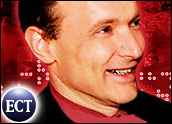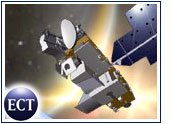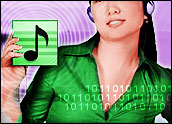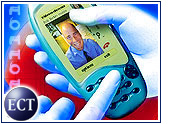
As the writer for several top-20 MP3.com hits last year, Paul Korda’s perspective on the convergence of technology and music comes from many years of working as a musician and songwriter — not to mention being a producer at EMI in the late 1960s. He has seen the old technology meet the new — and witnessed the transformation of monolithic Big Music into a distributed network of thousands of peer-to-peer enthusiasts.
In general, the technology press — while reporting regularly on the convergence of technology and entertainment — has paid attention to the file-sharing issue largely from a technological standpoint. For example, TechNewsWorld has given voice to the leaders of the peer-to-peer file-sharing movement, from CTO Phil Morle of Sharman Networks (the maker of Kazaa) to CEO Michael Weiss of StreamCast Networks (the maker of Morpheus). But in focusing on the clear-cut technological benefits of distributed computing and the future of worldwide peer-to-peer networks, the IT press has largely ignored artists’ perspectives.
In what could be one of the first interviews of its kind in the IT industry, Paul Korda talked with TechNewsWorld about the RIAA, the music industry, the onset of distributed networks and the convergence of technology and music.
His opinions — while wryly informed by many years working as an artist — resonate strongly with beliefs held by proponents of the file-sharing movement. “As organized religion must change with the times, so must the traditional record industry and its representative, the RIAA,” Korda told TechNewsWorld. The RIAA, he argued, must learn to adapt to social changes and be generous to its future public. Taking legal action against customers, he said, only drives them to greater independence.
But at that point, Korda deviates from sharing any affinity with leaders of the peer-to-peer movement. After all, Korda is a writer who holds copyright on much music — digital and otherwise. That’s what he does for a living. His perspective, as revealed in the interview, walks a careful line between both sides of the debate. The opinions expressed here, informed by what could be called a sort of postmodern neo-1960s viewpoint, are a manifestation of his attitudes toward music, technology and humanity.
TechNewsWorld: Given that you are walking such a fine line between warring factions in the file-sharing versus Big Music debate, what do you think of the original emergence of file sharing? And what of its effect on music?
Paul Korda: File-sharing’s effect on music for me, as an artist, is currency. If I record a song today about a current subject, people can hear it tomorrow, given the wide-reaching effects of the Internet. But to a songwriter, currency isn’t money. It’s the richness of the here and now, bringing new ideas to life, producing them and releasing them to the people. Currency is what technology is all about, and you either move into the future with the here and now, or you live in the past.
TNW: In terms of the music industry — culturally and politically — what does this mean?
Korda: File-sharing has helped bring more people around the globe a taste for a wider variety of music — which, in the long term, will increase overall sales, just as the transistor radio brought the Beatles to the nomads of the Saharan desert. Did any label say to ban the transistor radio or sue the nomads because they could hear a record without paying for it?
It means the new heads of the big music companies may have to think more deeply than their materialism. The music industry, in other words, needs to understand that the future of music is being formed right now. Don’t get me wrong. Both artists and business should be paid, but it takes time to lay the groundwork when a new format emerges.
TNW: Do you think, then, that there’s any way for the music industry — Big Music — to accommodate the increasingly wide-ranging tastes of current fans?
Korda: The big question for media monopolies is how to answer the public’s desire to access diverse media. Media monopolies narrow the amount of access. That’s their nature — to protect their business. But they have to remember that we’re the customers. It’s what the public wants that counts. If this new form of digital media is being widely embraced by the public, the record industry must learn to adapt.
What they should be doing is creating many independent Internet outlets for streaming and paid-for downloads, as well as automated — and perhaps even customized — HiFi CD production. It can all be handled online. Give the jobs in signing new artists back to the musicians and songwriters — as it always used to be until the early 1970s. And let the accountants and lawyers go back to accounting and lawyering.
In this kind of world, the music labels should sign the successful Internet artists who already have a following. It makes their job easier. Instead of spending enormous amounts on promotion — amounts that the artist generally shoulders — they can sign artists that already have an Internet following. That’s embracing the new form from the perspective of the recording industry. So much has been made of the technology issues in light of the RIAA’s lawsuits, but to transform the system, you have to be asking systemic questions and offering systemic solutions.
TNW: What of the users? Are they at fault for distributing “illegal” copies of music in digital form?
Korda: Yes, they are at fault, but they are the unwitting victims of their love of music. The RIAA should reconsider its strategy and focus on helping people realize that to create and produce the music takes the sweat and talent of both creative and industry people alike. What the RIAA should think about is a pro-music — or even pro-digital — campaign instead of an anti-fan inquisition. The RIAA does endorse iTunes and other legit services, but its latest strategy to sue the fans is counterproductive.
TNW: What about the file-sharing networks themselves? Not counting online music sources like iTunes, Rhapsody, MusicMatch and Napster, all of which do pay artists, do you think good can come of the file-sharing technology realized in applications like Kazaa, Morpheus and others?
Korda: Although I believe that original artistry involves chance, and that no robot can or should try to supersede nature, binary technology relates to musical theory. Measurement is equivalent in both elements. Heavy and light and all the shades between. Our character and physical nature were made for measurement.
So, in terms of the digital format, there is a relationship between the notes and the system that delivers them. If people share pirate files online, if they feel they have a unique point of view — which I’m sure they do have — they should form bands, write songs, and share those songs with the public.
TNW: From one perspective, the open-source software community has advanced the claim that information wants to be free, that thousands of programmers working collectively and producing great software — much like a band producing great music — are actually sharing their work around the world for “free.” How do you think the open-source community is different from the community of artists?
Korda: I’m a Mac fan, but I’ve been following some of the debates going on in the Linux community. The open-source concept is great, and there are actually companies making money in this industry. They’re doing it through services. And here’s where the concept of the album enters into the picture.
The album — a legitimately purchased musical work — is a kind of service to the fan because it is the whole concept that the artist has intended to create. A single is akin to watching only one scene of the movie, and file-sharing single downloads will always generate an incomplete part of the story.
TNW: So you think the concept of the album could be at the heart of this debate?
Korda: When you pirate files on Kazaa, the fact is you’re also getting hit-or-miss quality, not to mention exposing yourself to viruses. Even if you download a “complete” album from a peer-to-peer network, you might later discover the album to be completely varying in bitrate quality. Anyone who loves music will want to hear it at its best — maximum bitrate, CD-quality, or vinyl on HiFi. What the RIAA is behind on is the movement of people’s attitude to the future.
TNW: How do you think the RIAA — or the music industry — could embrace the concept of the album more completely? After all, Apple has just partnered with Pepsi to give away something like 3 million digital songs. Doesn’t this kind of single-song strategy fragment the notion of the album altogether? On a logistical level, how can the artist fight against the fragmentation of the album?
Korda: Give away 3 million songs? Without knowing the terms and the payment of royalties to the artists that are part of this deal, it would be hard to pass judgment on it. If the RIAA supports this move, then I wonder why they would prosecute file-sharers who are giving music away. Let’s face it, in these promotional giveaways, the corporations running these things usually are the greatest beneficiaries of the results.
The artists are in such a vulnerable position that they are happy to get their music continuing to be heard. If these single tracks will help lead the fans to the artists’ albums, then it would be acceptable to allow a song to be promotional. I would suggest that a commercial for the album be edited as a cross-fade at the end of every track that mentions the CD album so that the free track cannot be listened to without the cross fade.
Television is currently using that technique. If a fan has to listen to the commercial enough times, they’ll want to pay for the music without the voiceover.
TNW: What do you think of the current social or cultural climate — which is now so influenced by technology — in contrast to, say, the 1960s, when music was perhaps the main transformational cultural power?
Korda: The ’60s would have never seen such an outburst of creativity if music was just a commodity. Individuality in the ’60s did not come about by fashion-setting or manipulative media gimmicks. I remember when the VP of A&R at EMI played me the first pressing of Sgt. Pepper and tapped his foot, completely out of time, trying to find out what my 18-year-old head thought about the record. The RIAA are somewhat like that VP. They know change is coming, but they are a little out of time.
TNW: Then it seems, in the current climate, that all parties will remain dissatisfied until something changes. Is there hope for this situation? What do you think the industry will look like 10 years from now?
Korda: Doctors will be selling CDs that have been tested by the FDA for curative value once we’ve found the mechanisms for measuring the energies that are given off by notes. Let’s just hope they’re good singers, and that dentists stay out of the game. Seriously, though, I hope we all live in musical utopia, download bliss or just a world at peace with itself. The Earth is now a very turbulent place, and meaningful music plays a vital role in grounding people.
Paul Korda’s new album “Not for Robots” is available online at PaulKorda.com. His songs have been recorded and sung by Roger Daltrey, Frankie Valli, Dave Edmunds, Allan Holdsworth, Robert Palmer, Italy’s Patty Pravo and many others, with sales in excess of 20 million copies.





















































